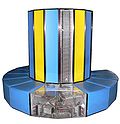Cray Urika-GD
This article contains content that is written like an advertisement. (July 2018) |
The Cray Urika-GD is a graph discovery appliance is a computer application that finds and analyzes relationships and patterns in the data collected by a supercomputer.
The Cray Urika-GD produces meaningful graphs based on large amounts of data, often from multiple sources, and to make useful connections among those data.[1] Many organizations now have vast stores of information like this—called "big data"—that they can analyze and use to improve their operations, products or services.
One example of the appliance in use would be a healthcare organization that helps to find, among its 13 million patient records, information that doctors could use to develop treatment plans.[2] Graphing the records of existing patients by categories such as illness, age, treatment and outcome may provide guidance on treating another patient.
“Big data” is also being tapped in professional sports.[3] In 2014, Cray revealed that a Major League Baseball team was using a Urika-GD appliance to graph and analyze its own performance statistics.[4]
References[edit]
- ^ Raj, Pethuru; Raman, Anupama; Nagaraj, Dhivya; Duggirala, Siddhartha (2015-10-16). High-Performance Big-Data Analytics: Computing Systems and Approaches. Springer. ISBN 978-3-319-20744-5.
- ^ "Patient Treatments" (PDF). Cray.com. Archived from the original (PDF) on 2015-09-23. Retrieved 2015-07-24.
- ^ Roger Craig (2014-07-18). "Commentary: Big data and the future of sports". Usatoday.com. Retrieved 2015-07-24.
- ^ "Supercomputers: Game on". The Economist. 2014-03-10. Retrieved 2015-07-24.
External links[edit]
- "Global Supercomputer Leader Cray Inc. Awarded $80 million by King Abdullah University of Science and Technology (KAUST)." Dataconomy. 18 November 2014.
- "The Evolution of Data Analytics Archived 2015-09-23 at the Wayback Machine." Infographic.
- Eileen McNulty (22 May 2014). "Understanding Big Data: The Seven V's." Dataconomy.

